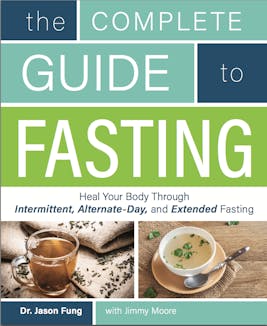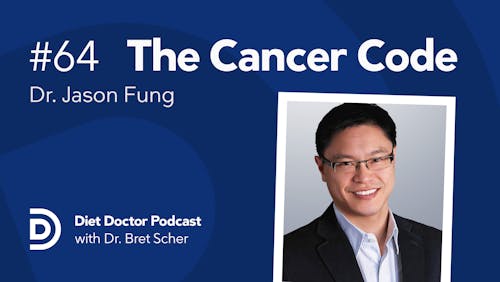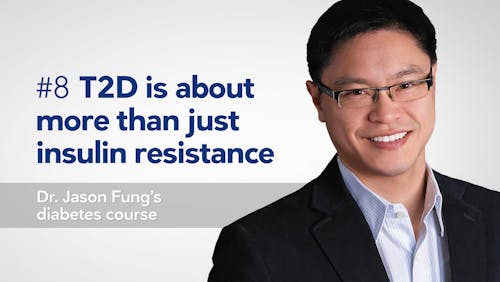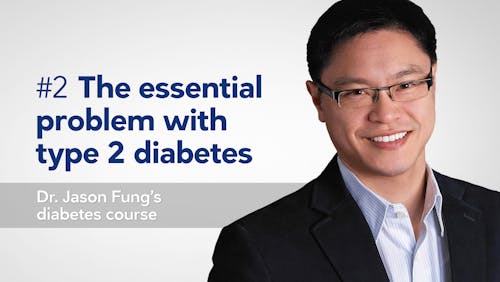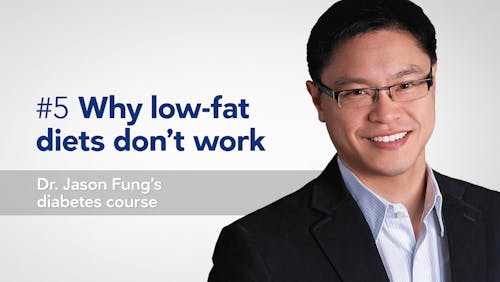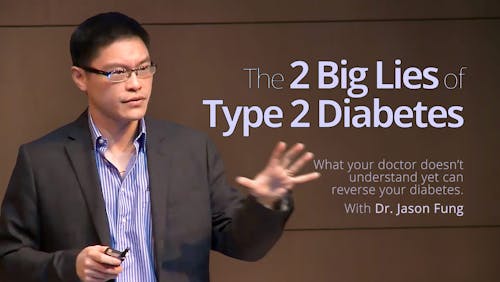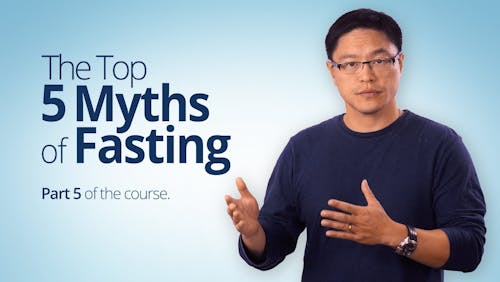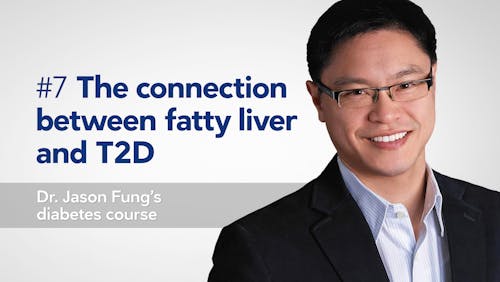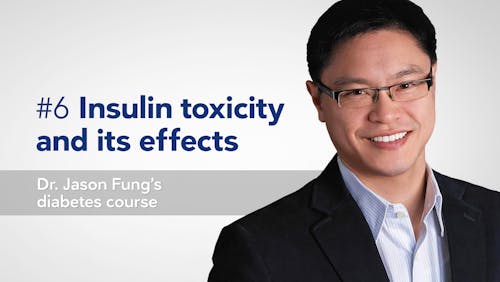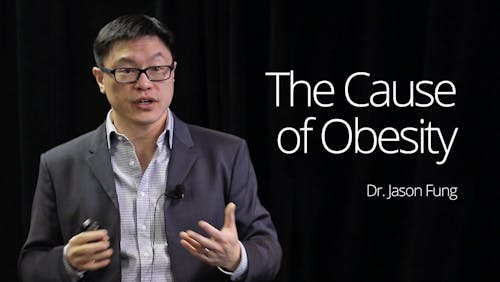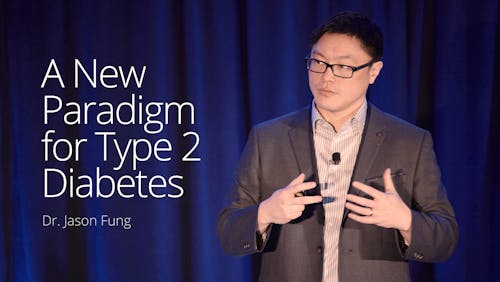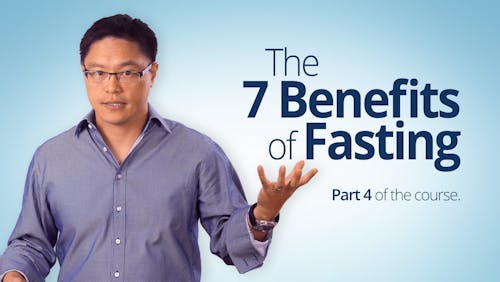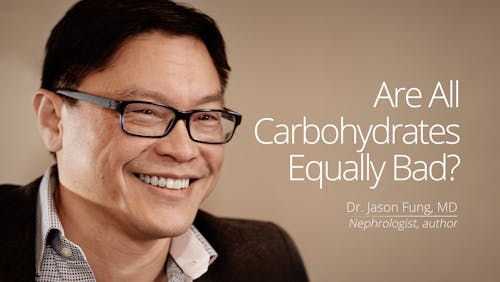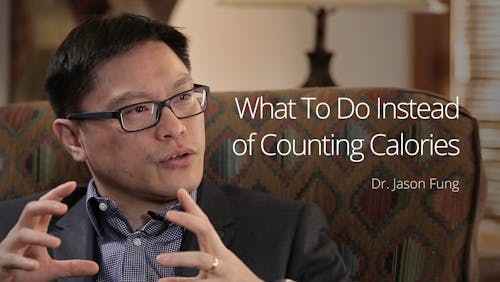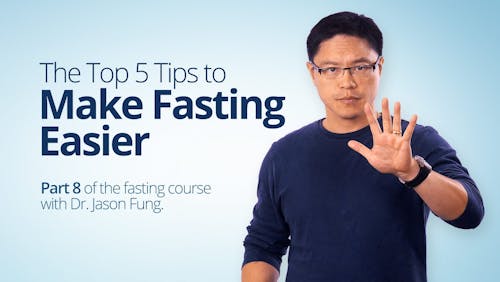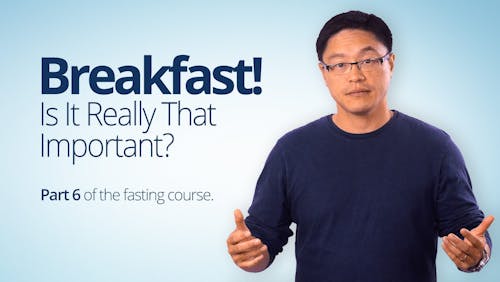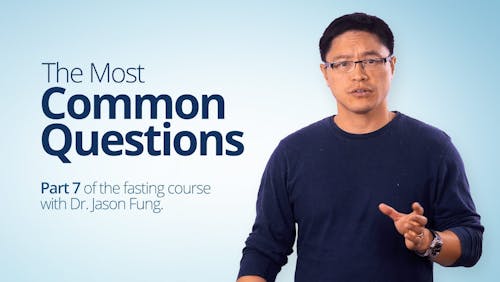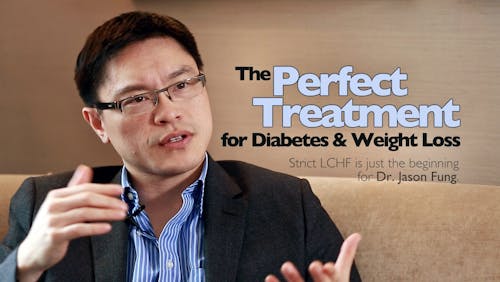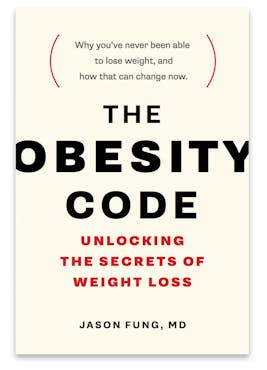How to eat: fast and break-fast
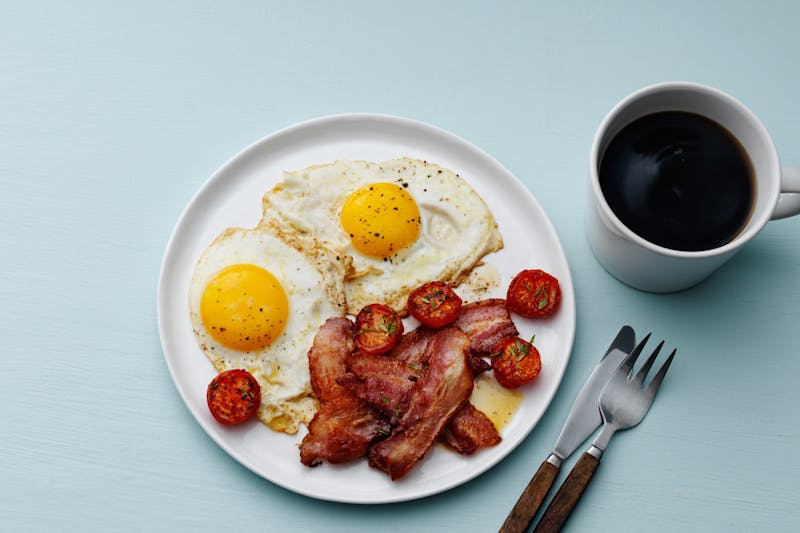
Is eating breakfast the key to losing weight?
Several interesting recent studies regarding meal timing deserve some attention. The first study, part of the Adventist Health Study 2, looked at a large cohort of relatively healthy people. Adults (>30 years old) attending Seventh-Day Adventist Church completed health questionnaires every 2 years. Over 50,000 people participated, and this particular study looked at meal timing and its relationship to body weight.
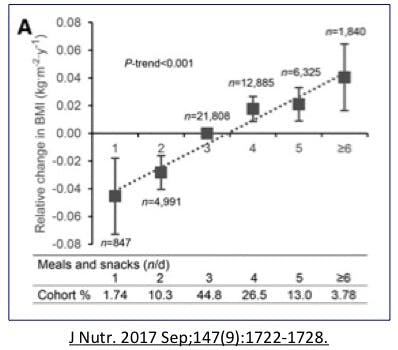


You should eat constantly to lose weight? How does that work? That’s like saying you should spray your clothes with water more often so that they dry faster. Eating more often generally results in more overall food intake. And increased food intake is not highly likely to make you lose weight. Nevertheless, frequent repetition by authority figures can convince us of anything.
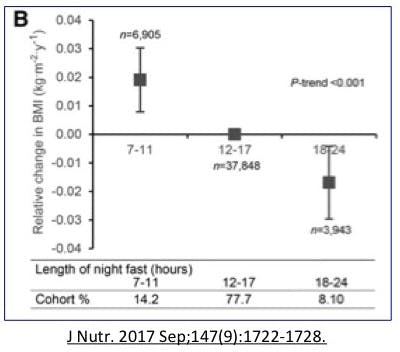


The study also noted that the longer you fast (18-24 hours) the less you weigh (since it was observational data it doesn’t prove cause and effect, but does make you wonder!). Again, not really hard to understand. If you give your body a good amount of time to digest your food and burn stored food (body fat) then you will likely weigh less. This jives perfectly with much of the data on intermittent fasting and restricted eating windows.
Is eating breakfast good for weight loss?
But there is more interesting data here. Eating breakfast is considered a very important part of weight loss. Are they correct? Indeed, yes.
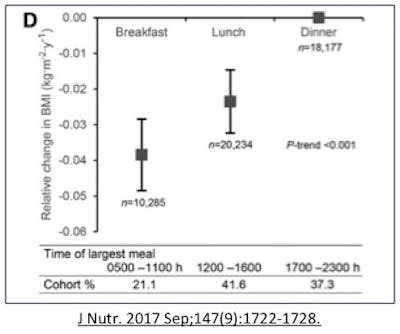


Well, the answer lies in the circadian rhythm, which I’ve written about previously. Recall that insulin is one of the main drivers of obesity, although there is an overlap with calories, to be sure. Different foods elicit different insulin responses, and therefore have different propensities to cause obesity. That is, 100 calories of cookies are more likely to lead to weight gain than 100 calories of broccoli.
The same food will also elicit different insulin responses at different times of the day. Eating the same food at dinner (compared to breakfast) gives you almost 30% more insulin effect. In other words, food can be more fattening when you eat it later at night. But the bad news for late eaters does not stop there. If you look at the circadian rhythm for hunger, you’ll find that hunger is lowest in the morning and greatest in the evening 8:00 pm or so.
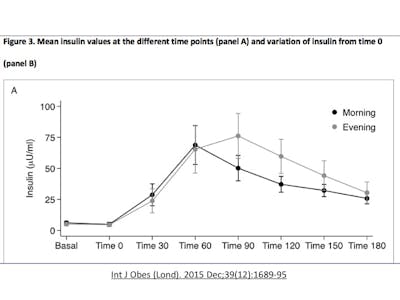


Another study (Bo, S et al) found the same phenomenon. In this crossover study, they took 20 healthy people, gave them the same meal but either in the morning or evening. So both arms had exactly the same people, eating the exact same meal, but only differing by the time of day. The evening meal stimulated significantly higher blood glucose and blood insulin response and insulin is the main driver of obesity. Even more interesting, the evening meal produced a much lower resting energy expenditure afterward compared to the morning meal.
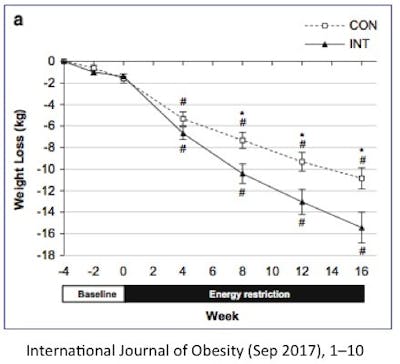


So, to be clear. If you eat one meal a day, best make it breakfast. If you eat two meals a day, best make it breakfast and lunch. BUT eating three meals (breakfast/lunch/dinner) is not necessarily better than 2 (lunch/ dinner), which is often the message given out by the ‘Never skip breakfast’ crew. That’s why I believe the best solution is to eat a large breakfast/ lunch and eat very little or no dinner. This gives you the benefits of both fewer meals and longer night-time fast.
So why skip breakfast?
So why do I skip breakfast myself?
Because that schedule of eating does not fit my lifestyle. I tend to eat dinner with my family every night, and we rarely eat breakfast together as a family, because we’re rushing to school and work. So I skip breakfast, because it fits my lifestyle, and eat dinner. This may not be optimal, but it is what works for me. I still get the fewer meals, and the longer night time fast, but I get the disadvantage of higher insulin effect at night. However, it is precisely this knowledge of science and practical experience that allows us at the Intensive Dietary Management program to devise individualized schedules for people. Trying to shoehorn an eating schedule into an incompatible life schedule is weight-loss suicide.
The other recent study that was fascinating was the MATADOR study. In this randomized study, patients either received energy restriction either as a constant 8-week block, or in 2-week chunks alternating with 2-week blocks of no energy restriction (eventually totaling 8 weeks of energy restriction).
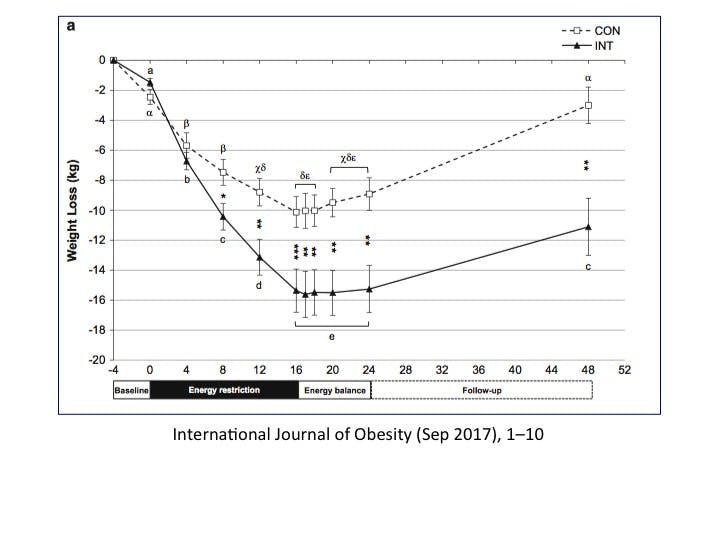


Does the ‘intermittency’ of the diet make a difference? You bet it did. Not only was there greater weight loss after 16 weeks, but at 6 months, the difference in weight was 8.1 kg – 17.8 pounds! There was weight regain in both groups at 1 year, but things looked a lot better in the intermittent diet.
Basal metabolic rate
What explains this huge difference? The answer is likely the change in resting energy expenditure (REE) also known as basal metabolic rate. The REE is how much energy is burnt by the body at rest (not at exercise). This is the energy (calories) used up in generating body heat, keeping the brain, lungs, liver, kidney, heart etc. working properly. This is not a static number but changes up to 30-40% depending upon the hormones. As you lose weight, the REE goes down (less body mass to heat, less energy needed) so you need to adjust the REE for Fat Free Mass (FFM) and Fat Mass (FM). Decreased REE is the main reason for the failure of The Biggest Loser contestants.
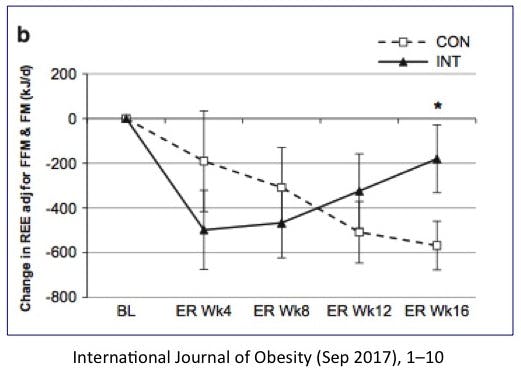


Instead, if you ‘diet’ intermittently, the body does not adjust and REE stays significantly higher. You have more energy, you don’t feel so cold, and weight stays off. I believe it is the INTERMITTENCY of the diet that makes it successful. We talk constantly about the question of ‘What to Eat’ but almost never consider the equally important question of ‘When to Eat’. That is the reason, in my Intensive Dietary Management Program, we stress that you sometimes need to change things up.
One common question is whether eating one meal a day (OMAD) is acceptable. That is a daily 23-hour fast. Sounds pretty good. And it works well for a lot of people. But a lot of people will also plateau at a weight higher than they would like. At that point, we suggest that they do something to change the schedule. Sometimes we’ll suggest changing the diet, and other times we’ll suggest changing the fasting regimen. If you have plateaued, just do something different.
Does skipping breakfast lead to more heart disease?



Even the author is not so naive as to suggest a causal relationship. He said, “It’s not that you skip breakfast, you get plaques.” Of course not. People who skipped breakfast were also at higher risk of heart disease for other reasons, too. It’s kind of like saying that people with grey hair are at higher risk of dying (true – because they tend to be older). Therefore, to reduce the risk of dying, you simply need to dye your grey hair black. There’s a clear association between having an ‘A’ on top of your test and doing well in school. So, obviously, to do well in school, you should write ‘A’ on top of every test your write so you’ll do well. It’s absurd. But that doesn’t stop the media hype.
Understanding the science helps cut through the bull. There’s nothing wrong with eating breakfast. Eating more at breakfast and less at dinner makes physiologic sense for weight loss, because it reduces the insulin effect. But if you eat the same dinner but add breakfast, don’t expect that eating more food makes you lose weight.
Try it
Intermittent fasting for beginners
Top videos with Dr. Fung
More with Dr. Fung
Dr. Fung has his own blog at idmprogram.com. He is also active on Twitter.
His book The Obesity Code is available on Amazon.
His new book, The Complete Guide to Fasting is also available on Amazon.
